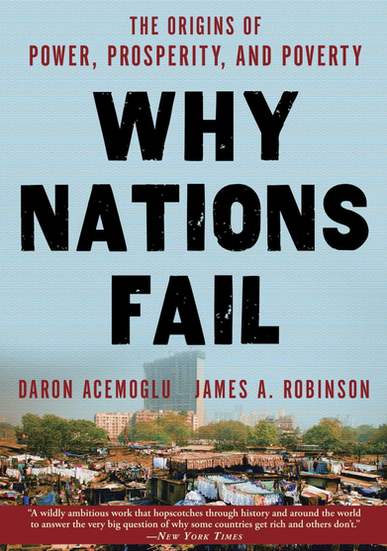非洲風情:博茨瓦納─廣納式制度締造關鍵時期
- glosnapgs
- 2024年4月27日
- 讀畢需時 4 分鐘
位於非洲南部的博茨瓦納,一九六六年脫離英國獨立時,一度是世界上最貧窮的其中一個國家。鄰近的國家:南非、納米比亞及羅德西亞等曾被白人統治,對於由黑人所治理的獨立非洲國家充滿敵意。博茨瓦納一躍成為撒哈拉以南非洲人均收入最高的國家,廣納式制度可謂功不可沒。
在《國家為什麼會失敗》中,作者認為博茨瓦納發展歸功於「科加勒(Kgotla)」的議場制度。早在十九世紀,當地已推行中央集權及集體決策,部族政策需提交至酋長的科加勒,並鼓勵成年男性參與政治,在會議討論徵稅、公共政策及部落爭議等,酋長提案遭駁回時有所聞。
酋長職位並非沿用世襲制度,而是開放予任何賢能之士,經得起考驗才享繼承權。由於權力得來不易,酋長亦傾向考慮國家發展利益。為阻羅德西亞的不列顛南非公司,吞併茨瓦納(博茨瓦納前身)八個部族,三名酋長前往倫敦遊說政客,情願讓英國統治,也不願被羅德西亞剝削。
殖民時期,茨瓦納同意英國在當地興建鐵路。獨立後的首任總統奎特.馬西雷,在當時從事農業的他,計劃租用兩卡車廂運送農作用被拒,即使有白人朋友的協助,負責人向他索取的價錢,卻是較白人用家高出四倍。馬西雷明白,除法律制度外,白人的殖民地的行為同樣限制黑人發展。
博茨瓦納在一九六六年獨立以來,繼續奉行廣納式制度,包括定期舉行公平的選舉,落實中央集權及多元部落制度,並且建立財產私有權的經濟制度。六、七十年代先後通過酋長法,取消酋長分配土地的權利,及視乎情況和需要,容許總統罷黜酋長,強化政府及民選總統的權力。
有別於部分失敗國家陷入資源詛咒,酋長在殖民時期已經反對勘探礦物,擔心歐洲人將會因應資源影響自治權。在當地宣布勘探出鑽石前,當地修例國有化礦物,確保鑽石收入用作建立國家體系、基礎建設及教育福利等,反映廣納式制度造就良性循環,令國家逐步加速發展。
5 名稱:國家為什麼會失敗:權力、富裕與貧困的根源 (Why Nations Fail: The Origins of Power, Prosperity, and Poverty)
作者:Daron Acemoglu、James A. Robinson
年份:2012
出版地:美國
出版社:Crown Business
類別:比較政治、經濟學
評分:8/10
Botswana - Interaction between Inclusive Institutions and Critical Junctures
Located in southern Africa, Botswana was once one of the poorest countries in the world when it gained independence in 1966. Its neighboring countries, namely South Africa, Namibia, and Rhodesia, were ruled by the white and showed hostility to independent nations governed by the black. Botswana became a country with the highest per capita income in sub-Saharan, and its inclusive system was a contributing factor.
"Why Nations Fail” upheld that the "kgotla" was attributed to the development. In the 19th century, Tswana developed centralization and collective decision-making procedure. All the tribal policies were dealt with in the council. Adult males were encouraged to speak out in the general assembly, in terms of the tribal disputes and the imposition of new levies. Overruling the wishes of the chief is not unknown.
The chieftaincy was not strictly hereditary but open to any man demonstrating significant talent and ability. The king is king by the grace of the people. Considering the national interest, chiefs from Ngwato, Ngwaketse, and Kwena, which were 3 of the 8 Tswana states, decided to opt for the lesser of two evils: greater control by the British rather than annexation by Rhodes.
Under the British colony, the country conceded the construction of railways in Bechuanaland. Quett Masire, the first president of independent Botswana, experienced the suppression as a farmer previously. He failed to rent 2 rail trucks to move his crop. Under the help by the white friend, the station master reluctantly agreed but quoted him 4 times the rate for whites.
Since its independence in 1966, Botswana has continued to embrace the inclusive political system, by holding competitive and fair elections regularly, implementing centralized power with a diverse tribal system. The government set up an economic system enforcing property rights. The Chieftaincy Act enshrines the power of the elected president by removing from chiefs the right to allocate land, and enabling the president to remove a chief from office if necessary.
Unlike some failed states plagued by the resource curse, the chiefs in Botswana blocked mineral exploration during the colonial period, in order not to undermine their autonomy by the great powers due to the resources. When the first diamond discovery was under Ngwato land, the government changed the law so all subsoil mineral rights were vested in the nation. This is how the inclusive institution created a virtuous circle in the country's development.
Title: Why Nations Fail: The Origins of Power, Prosperity, and Poverty
Author: Daron Acemoglu, James A. Robinson
Year: 2012
Region: USA
Publisher: Crown Business
Genre: Comparative Politics, Economics
Score: 8/10








留言